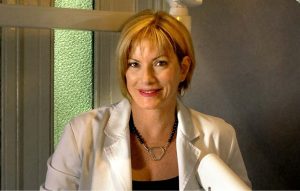
Losing teeth can be as devastating as losing a limb. If you’ve lost any teeth as an adult, especially if it’s a lot of teeth, you may feel a sense of bereavement and begin to feel socially withdrawn.
Trying to keep it a secret by angling your head in a certain way when you talk, or by not smiling with your mouth open impacts on confidence and self-esteem in daily life.
Not feeling comfortable talking about it only compounds the feelings of alienation and taboo.
Cosmetic dentist and implants specialist, Dr Sandra Short, meets people with these issues every day.
“The people who come to me are generally people who have got a failing dentition or people that have got full dentures at the moment,” says Dr Short.
“Failing dentition is where the teeth are really at a stage where we can’t save them. It can be young people starting in their 20’s and going right through to people in their 80’s.”
Missing teeth and corresponding issues such as infected gums also impact on the ability to chew food properly. When people can’t eat, their nutrition suffers and their health suffers. According to World Health Organisation Research, they die 9.8 years earlier. One of the biggest challenges facing geriatric medicine is inability to eat, which affects oral medications.
Traditionally, dentures or implants have been the two main options to replace missing teeth.
Apart from the constant underlying sense of anxiety that they may fall out, dentures come with a range of problems. They rest on soft tissues – causing sore spots in the mouth; contribute to further bone loss and may cause nerve compression when there is a lot of bone loss. The palatal coverage interferes with normal sensation of food and taste; they are loose fitting which makes it difficult to eat and speak; food gets caught underneath when speaking. There is an on-going expense for maintenance – relines and denture adhesives are needed as the bone continues to resorb (disappear). To top it all off, people wearing dentures can appear older as bone loss causes wrinkles and facial deformity.
The John Hopkins University listed the 10 most important health recommendations. Number 4 on their list is having dental implants instead of dentures.
Dr Short graduated in dentistry in 1975 – and at that time the focus for dentists was to save teeth. Now with over 30 years’ experience behind her, including studying with Dr Leonard Linkow (“the father of implant dentistry) in New York, Dr Carl Misch (USA) and Dr Palo Malo (Portugal), Dr Short can say definitively that implants work and are in fact the most successful procedure in Dentistry today.
“Teeth are weak, especially if they are heavily filled or if there is gum disease,” says Dr Short.
“They are designed to last 30 years – for cave men – but now we are living a lot longer – maybe up to 100 years. We are literally out-living our teeth!”
Replacing teeth individually with conventional implants is, however, an invasive procedure that requires up to 12 months for completion. That can be especially daunting for people who don’t like visiting the dentist, or those who have dental phobias. Bone grafting is often also required and the outcome of this can be unpredictable. The cost of dental implants (approx. $5,000 – $8,000 per tooth) makes this a prohibitive option for many people.
“We needed a sound mechanical structure to replace teeth more easily, and one that could be easily repaired. This new procedure, Bridge-On-4, is the solution for full denture replacement or for a failing dentition.”
The Bridge-On-4 clinical solution has been developed to maximise the use of available bone and allow for immediate function. Using only four implants per jaw with tilted implants at the back of the mouth they provide secure and optimal support for a fixed bridge, even with minimal bone.
As a fixed bridge solution, compared with removable dentures, the patient’s phonetics, mastication and taste functions are restored to normal. The unique engineering design enhances hygiene and health and rehabilitates not only the teeth but also the lost hard and soft tissue. Excellent lip support is provided by the customised gum replacement supported by the underlying infrastructure.
“Techniques are brilliant and very well researched. There’s nothing that’s experimental about it. There is a set protocol and if you follow that protocol you know the results.”
The full denture patient can receive the benefits of a fixed full arch bridge for about half the price of conventional implants and bridge-work. Teeth and soft tissue can be replaced and in most cases the final fixed bridge can be inserted within days of the surgery. Recovery time is minimal.
“People love having their own teeth and after Bridge-On-4 it really is like their own teeth. It’s as close to having your own teeth back again as you can get. I love seeing my patient’s big smiles after this treatment – they’re overjoyed and they can’t wait to eat their favourite foods.”
visit: www.dentartistry.com.au to view video of Dr Short explaining Bridge-On-4.



5 Comments
I need to replace only three teeth but I am curious as to the average price of a Bridge-On-4?
I need a new bridge as my old one died . The specialist I was recommended to see hasn’t got back to me for 9 months . He gave me a temporary denture which has broken 3 times. My old bridge was an upper bridge with 4 teeth on it .
Could you give me an approximate estimate of the cost of your bridge on 4 procedure.
Cheers
Kevin
Hi Kevin, can you provide an email address and I will have Dr Short contact you?
Hi would like to get a quote for my husband and l
Hi I like arought quite on 4 post implant possible 10 teeth top